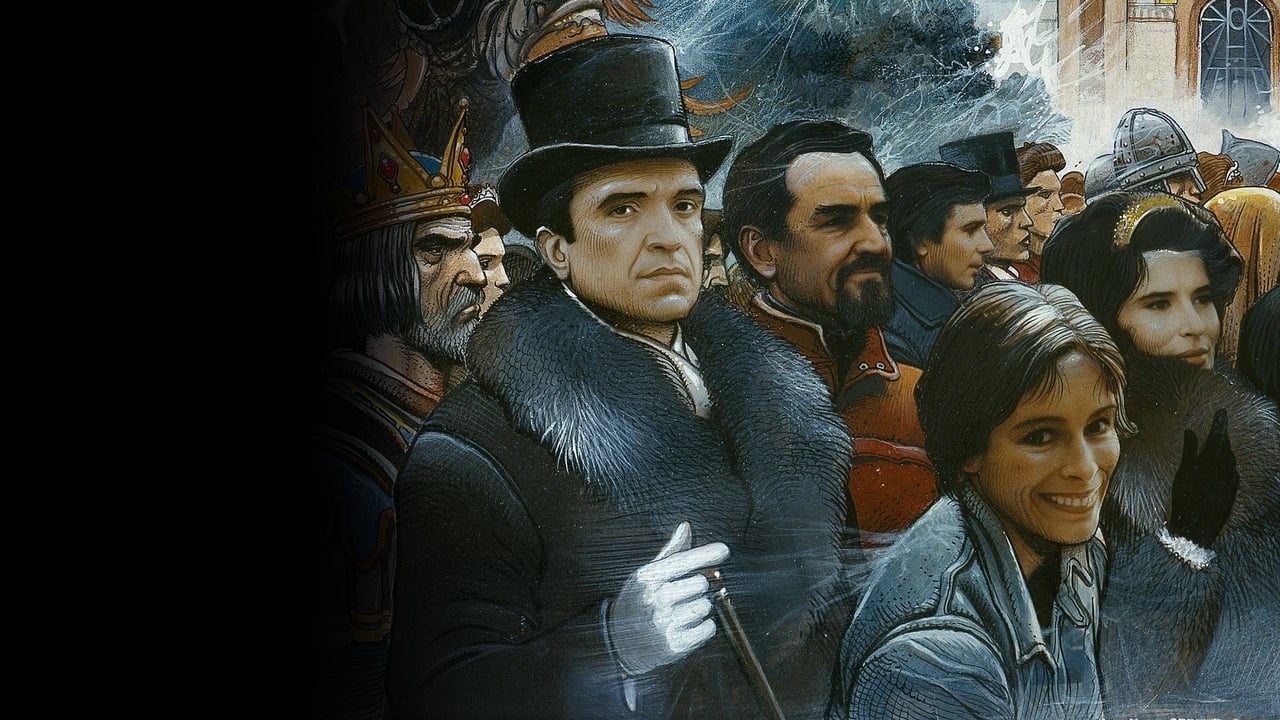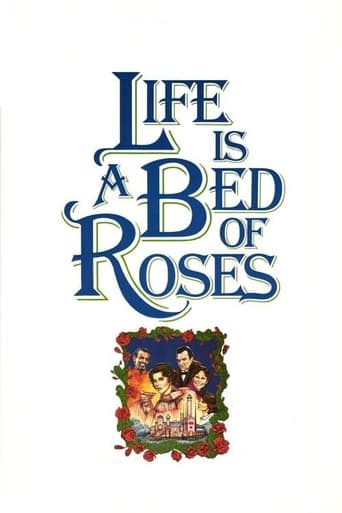

I saw Life is a Bed of Roses as an admirer of Ruggero Raimondi, and I do think it is not going to please everybody with a sometimes sluggish pace, the choral interruptions sometimes infuriating and while the three part structure to be interesting with some great ideas introduced the story can lack coherency with some ideas coming across as half-baked and people may find it difficult to get into. However, it is filmed very handsomely with the set and costume design beautifully rendered especially in the last tale. The score is wonderful, giddy and haunting, I loved the theme of the perfectibility of human existence. Of the three tales I found the Forbek tale to be the most well-done with the firmest ending and a genuine sense of drama. The last story was great in idea but never satisfactorily explored, apart from Robert's relationship with his son, everything else seemed underdeveloped and clichéd. I also admire Resnis' ambition, this is clearly an ambitious film and is well-intended, but the execution didn't quite come together. The characters are deliberately kept at distance, and while most are not very easy to empathise with, I did think Robert and Forbek were well-realised. The acting is good though, Ruggero Raimondi always was a fine actor even in the operatic roles like Don Giovanni and Scarpia that he was famous for, and I think he was a big reason why the first tale was believable. Fanny Ardent and Geraldine Chaplin play their roles with ardour, Ardent in particular is incredibly radiant. and Vittorio Gassman is a good Walter. As for Pierre Arditi he does appear obnoxious at first, but plays his role also with pathos. Overall, an uneven film but quite interesting. 6/10 Bethany Cox
... View MoreALAIN RESNAIS'S film ''Life Is a Bed of Roses'' is nothing if not elliptical.''Life Is a Bed of Roses,'' which was written by the distinguished screenwriter Jean Gruault, can indeed be humorous. But it's liable to prompt at least as much head-scratching as laughter. Mr. Resnais and Mr. Gruault, who also collaborated so much more successfully on ''Mon Oncle D'Amerique,'' have made a far more precious and facetious film this time, one whose purposes are often far from apparent. In fact, their methods have become indirect to the point of near-perfect obliqueness.''Life Is a Bed of Roses'' exists on three levels, each of a deliberate - and at times quite delightful - eccentricity. First of all, there is a World War I scenario, if ''scenario'' can properly describe the screenplay's bizarrely theatrical style. The wealthy Michel Forbek (played by the opera singer Ruggero Raimondi) announces plans to build what he calls ''The Temple of Happiness,'' a fanciful palace that is never completed.Enough of this cheerfully weird structure is erected, however, for Forbek to stage an experiment therein. A group of his friends is isolated in the palace, dressed in flesh-colored silk robes and delicately coaxed back into an infantile innocence, or at least that is Forbek's intention. Cries of ''Love! Happiness!'' accompany the experiment, since most of the film's characters have the habit of bursting into saccharine song.At what seems to be the present time, a different congregation assembles on the same spot. The castle has now become an educational institution, with a staff that praises the place as ''typical of early 20th-century symbolist architecture.'' A dashing architect (Vittorio Gassman) has another opinion. ''Is that thing edible?'' he asks. ''It's not architecture, it's pastry.'' Attending a weekend conference is a very naive creature who happens to be named Miss Rousseau (Sabine Azema), and who sweetly sings ''The man I'll fall in love with is not a bar of soap.'' (This is not the complete nonsequitur it sounds like.) Also on hand is Nora Winkle (Geraldine Chaplin), an American who appears dressed for combat and who makes a wager that she can orchestrate a love affair between two of the other participants. Nora, we are told, has ''dared to masquerade as a man and work in minus-81-degree weather to write the revolutionary report 'The Sexual Fantasies of James Bay Workmen.' '' Hers is by no means the most peculiar research represented here, since Robert Dufresne (Pierre Arditi) uses toys and frantic mocking gestures in his work with children. ''You have perfectly conveyed the substance of your work,'' remarks Robert's superior approvingly after a lunatic 10-second demonstration.Also woven through ''Life Is a Bed of Roses'' is a medieval pageant, pitting a king against a heroic young warrior in a fanciful landscape.Although ''Life Is a Bed of Roses'' has a deliberately distancing, non-realistic style, and although its uniquely skewed logic effectively prevents the audience from trying to regard it rationally, the film winds up more purely confounding than can have been intended. Arch little asides, like the abundant choral flourishes, cannot help but feel pointless without a clear sense of what they are departures from .The film's ''variations on the theme of dominance,'' as Mr. Resnais described them, seem incompletely expressed. Despite the film's handsome look and its fine cast (Fanny Ardant also appears as a key figure in the World War I experiment), it's more memorable for various isolated witticisms and images than it is as a coherent whole. And its flightier touches can be deadly.About the title, Mr. Resnais explained that ''Life Is a Novel'' is its French equivalent. French parents, he said, often tell their children that ''life is not a novel,'' in the same way that American parents declare ''life is not a bed of roses.'' For anyone wondering how pointlessly knotty the film itself can become, that's a fair indication.
... View MoreWatching the first few moments, you realize it's going to be a parody - and certainly it *is* a parody, but I'm not sure of what (a fairy tale? an opera? a Hollywoodian C-movie? - if there was something like that), and I can assure you it's not worth watching. It's simply a pointless film (cf. a good parody is everything but pointless), with pretentious, shallow speeches of extremely sketchy characters. It's like a commedia dell'arte. Or better, it's like a botched commedia dell'arte. And the score... sung in an intentionally incompetent way (something Greenaway will use much more efficiently), it *is* painful to listen to (unless one wears some sate-of-the-art earplugs, haha). Go for quality movies (e.g. A. Mitta's How Czar Peter the Great Married Off His Moor, 1976) and steer clear of this mistake.
... View MoreHaving seen this film only once, in 1983 during its initial NYC engagement, I can resonantly advise anyone lucky enough to get the chance: prepare for elegant effervescence. The score by itself is unforgettable -- giddy, but it'll haunt you.
... View More